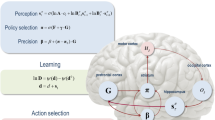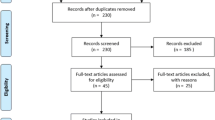Abstract
Conversational repairs used by children in Brown's Stages III and V and by 5- to 6-year-olds were investigated. A linguistic analysis revealed that each group repaired their utterances when not understood but did so using different repair types. Individual preferences for using a specific repair type was observed, although preferences decreased with age.
Similar content being viewed by others
References
Ammons, R. B., & Ammons, C. H. The Quick Test: Provisional manual. Missolula, Montana: Psychological Test Specialists, 1962.
Bates, E.Language and context. New York: Academic Press, 1976.
Bloom, L., & Lahey, M.Language development and language disorders. New York: Wiley, 1978.
Brown, R.A first language: The early stages. Cambridge, Massachusetts: Harvard University Press, 1973.
Bruning, J., & Kintz, B.Computational handbook of statistics. Glenview, Illinois: Scott, Foresman, 1968.
Dore, J. A. Pragmatic description of early language development.Journal of Psycholinguistic Research 1974,4, 343–350.
Gallagher, T. Revision behaviors in the speech of normal children developing language.Journal of Speech and Hearing Research, 1977,20, 303–318.
Gallagher, T., & Darnton, B. Conversational aspects of the speech of language-disordered children: Revision behaviors.Journal of Speech and Hearing Research, 1978,21, 118–135
Garvey, C. The contingent query: A dependent act in conversation. In M. Lewis & L. A. Rosenblum (Eds.),Interaction, conversation and the development of language. New York: Wiley, 1977.
Garvey, C. & BenDebba, M. An experimental investigation of contingent query sequences.Discourse Processes, 1978,1, 36–50.
Glucksberg, S., & Krauss, R. What do people say after they have learned to talk? Studies of the development of referential communication.Merrill-Palmer Quarterly, 1967,13, 309–315.
Hymes, D. Competence and performance in linguistic theory. In R. Huxley & E. Ingram (Eds.),Language acquisition: Models and methods, New York: Academic Press, 1971. Pp. 3–24.
Krauss, R., & Weinheimer, S. Concurrent feedback, confirmation, and encoding of referents in verbal communication.Journal of Personality and Social Psychology, 1966,4, 343–345.
Lee, L. Developmental sentence analysis. Evanston: Northwestern University Press. 1974.
Longhurst, T. Effects of communication failure on speaker and listener behavior.Journal of Speech and Hearing Research, 1973,16, 1928.
Peterson, C., Danner, F., & Flavell, J. Developmental changes in children's responses to three indications of communicative failure.Child Development, 1972,43, 1463–1468.
Spilton, D. Some determinants of effective communication on four year olds.Child Development, 1977,48, 968–977.
Valian, V. & Wales, R. What's what: Talkers help listeners hear and understand.Congnition, 1976,4, 155–176.
Author information
Authors and Affiliations
Rights and permissions
About this article
Cite this article
Konefal, J.A., Fokes, J. Linguistic analysis of children's conversational repairs. J Psycholinguist Res 13, 1–11 (1984). https://doi.org/10.1007/BF01067899
Accepted:
Issue Date:
DOI: https://doi.org/10.1007/BF01067899




